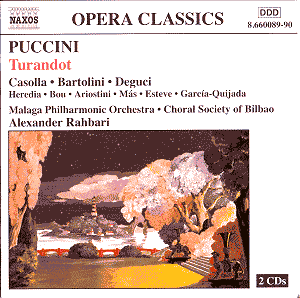Any recording of Turandot requires a full range
recording, a chorus that is strong, full voiced and resonant,
and dramatic conducting. All that is before we come to the principal
soloists, two of whom, the Princess Turandot and Prince Calaf,
require full toned, strong, steady spinto voices. There is also
the matter of the lesser parts, the Emperor Altoum and the palace
‘officials’, Ping, Pang and Pong, who all have significant contributions
to make. On record the gold standard is set by Decca’s 1972 Kingsway
Hall recording with Sutherland and Pavarotti supported by Caballé,
no less, as Liu and Ghiaurov as Timur. Other recordings that have
followed have been less successful, often because of the vocal
demands Puccini makes on the principal parts. Ricciarelli, for
Karajan (DG full price) is vocally stretched as Turandot, whilst
the two principal roles are a size too big for Carreras and Caballé
(EMI mid price) in an over-resonant recording with the soloists
set too far back. An earlier EMI issue, like its stable-mate at
mid-price, has Birgit Nilsson and Franco Corelli. No problem about
voice size there, but the recording now sounds flat and rather
dated. So, room for a Naxos ‘budget price’ issue? Well perhaps;
except that the Decca set has, for most of the last 18 months,
been available in UK superstores, and mail order, at little more
than the Naxos price and it comes complete with libretto and translations!
On that basis I feel justified in highlighting comparisons between
this new Naxos and the 30-year-old Decca whose recording quality
remains vivid.
First, there is the issue of timing. This Naxos
is 10 minutes shorter than the Decca and it has nothing to do
with Rahbari’s vibrant, dynamic conducting; Mehta on Decca is
equally strong. I suspect this recording is associated with theatre
performances. The back cover of the jewel case does state ‘This
live recording was made and edited at 24 bit resolution’. Given
that it was recorded on consecutive days, surely it was not taken
from live theatre performances? If so, it might explain the ‘theatre’
cuts and the wavery, rather thin, voices of some of the singers
in the minor parts, and the strain exhibited by some of the principals
in this vocally demanding work. Whilst the recording quality,
conducting and chorus can stand comparison with the Decca, the
soloists are not in the same league. Giovanna Casolla sings her
great solo, ‘In questa reggia’, (CD 2 tr.1) with good dramatic
thrust and marginally better diction than Sutherland, but not
without some strain and spread. As Calaf joins her, the tenor
tone that Bartolini used at the start (CD 1 tr.2), is now more
baritonal and throaty, even coarse, whilst in the ‘riddles’ (CD
2 tr.6), his tone is too often raw and uncovered. By ‘Nessun dorma’
(CD 2 tr.10) his tone and phrasing are not a pleasure on my ear.
Thankfully, the Liu of Masaka Deguci is quantum leaps better of
voice and phrasing. Her second aria, and poignant death, (CD 2
tr 14-15) is particularly affecting and dramatic.
Given the timing of the discs, I fail to see
why the whole of Act 2 is not contained on CD 1. As it is, Scene
2 is split: CD 2 starts with ‘In questa reggia’. The same failing
is on the Decca too! However, in the latter case inclusion would
have pushed the timing to 77min; not recommended in 1984 when
the set emerged on CD, whereas here the total would have been
a mere 71 min.; many Naxos issues are well beyond that time. To
finish on a more positive note, the booklet has good, brief biographical
notes on the participants and an excellent track-related synopsis.
Robert J Farr
Paul
Shoemaker felt a little more positive about this recording
